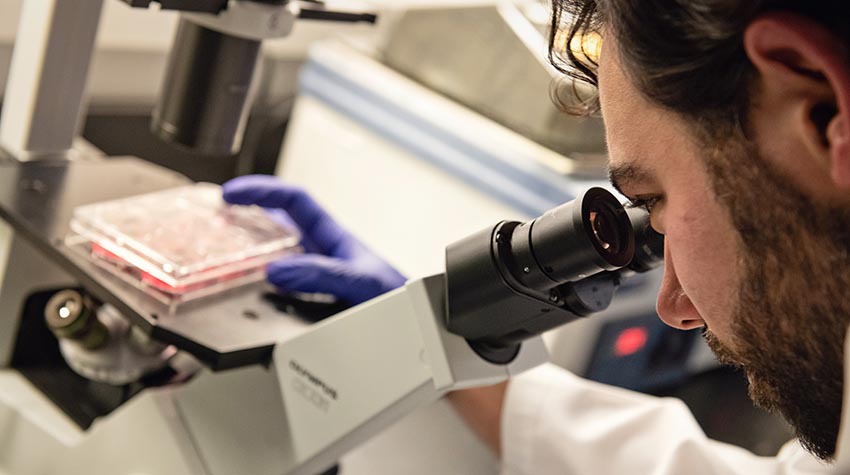Prostate Cancer Regulator Plays Role in COVID-19, Providing a Promising Treatment Lead
By Nicole Fawcett | 21 December | labblog.uofmhealth.org/lab-report
Clinical trials underway are testing whether drugs that target the androgen receptor – successful in controlling prostate cancer – could also work against the coronavirus.
By taking a lesson from prostate cancer, researchers now have a promising lead on a treatment for COVID-19.
 Two proteins, ACE2 and TMPRSS2, help the coronavirus gain entry and replicate within cells. TMPRSS2 is well-known to Arul Chinnaiyan, MD, PhD. His lab discovered that TMPRSS2 fuses with the ETS gene to drive more than half of all prostate cancers. They also knew that TMPRSS2 was regulated by the androgen receptor.
Two proteins, ACE2 and TMPRSS2, help the coronavirus gain entry and replicate within cells. TMPRSS2 is well-known to Arul Chinnaiyan, MD, PhD. His lab discovered that TMPRSS2 fuses with the ETS gene to drive more than half of all prostate cancers. They also knew that TMPRSS2 was regulated by the androgen receptor.
So when cancer research shut down in the spring, Chinnaiyan’s lab turned its attention to the coronavirus. With a grant from the National Cancer Institute, the team used its existing knowledge and resources to determine how TMPRSS2 was regulated in the lungs.
They found that, just like in prostate cancer, TMPRSS2 is regulated by the androgen receptor in the lungs. And notably, blocking the androgen receptor led to lower expression of TMPRSS2 as well as ACE2, which led to decreased coronavirus infection in mice and cellular models. Results are published in PNAS.
“What’s especially appealing about this is that anti-androgen treatments are already FDA-approved. This opens the door to look at these drugs, which we know work in prostate cancer, as potential COVID-19 treatments,” says Chinnaiyan, director of the Michigan Center for Translational Pathology.
 Using cell lines infected with SARS-CoV-2, the virus that causes COVID-19, researchers found that inhibitors of the androgen receptor, including enzalutamide, apalutamide, and darolutamide, inhibited the coronavirus infection.
Using cell lines infected with SARS-CoV-2, the virus that causes COVID-19, researchers found that inhibitors of the androgen receptor, including enzalutamide, apalutamide, and darolutamide, inhibited the coronavirus infection.
They also tested a class of drugs designed to inhibit or degrade BET proteins. BET protein activity is essential for androgen signaling and these drugs are being looked at for prostate cancer. In cell lines infected with coronavirus, the BET inhibitors decreased androgen signaling and inhibited viral infection.
The findings also provide some explanation for observations that SARS-CoV-2 affects men more than women. Researchers looked at human lung tissue and found higher androgen receptor signaling in men than women. They also found androgen signaling was highest in men over 70 and in smokers.
“This explains why elderly men who are smokers are more vulnerable to the coronavirus infection. High androgen receptor signaling allows the virus to gain entry and replicate more easily. This may explain why the disease is often particularly severe in older men,” Chinnaiyan says.
Several clinical trials are underway testing androgen receptor inhibitors as a treatment for COVID-19, and additional trials are being developed to look at BET inhibitors.
Additional authors are Yuanyuan Qiao, Xiao-Ming Wang, Rahul Mannan, Sethuramasundaram Pitchiaya, Yuping Zhang, Jesse W. Wotring, Lanbo Xiao, Dan R. Robinson, Yi-Mi Wu, Jean Ching-Yi Tien, Xuhong Cao, Stephanie A. Simko, Ingrid J. Apel, Pushpinder Bawa, Steven Kregel, Sathiya P. Narayanan, Gregory Raskind, Stephanie J. Ellison, Abhijit Parolia, Sylvia Zelenka-Wang, Lisa McMurry, Fengyun Su, Rohit Mehra, and Jonathan Z. Sexton.
Funding is from the Prostate Cancer Foundation, National Cancer Institute grants including a COVID-19 supplement to P30-CA046592, P50-CA186786, R35-CA231996, and U01-CA 214170.
—
This story was written by Nicole Fawcett and originally appeared in the Michigan Medicine Health Lab Blog on 12/21/2020. The full publication on PubMed is accessible here.
 ON THE COVER
ON THE COVER
 ON THE COVER
ON THE COVER
 ON THE COVER
ON THE COVER
 ON THE COVER
ON THE COVER
 ON THE COVER
ON THE COVER
 ON THE COVER
ON THE COVER
 ON THE COVER
ON THE COVER
 ON THE COVER
ON THE COVER
 ON THE COVER
ON THE COVER
